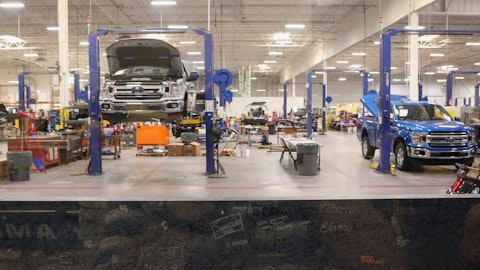Daniel McHenry: Absolutely, John. We would be happy to go to 3. Clearly, pre-pandemic, we were above those levels and we were okay at those levels as well.
Operator: Our next question comes from Rajat Gupta from J.P. Morgan.
Rajat Gupta: Are you going to comment at all, if the consumer backdrop does remain weak, be it higher interest rates, seeing some delinquency defaults picking up and you don’t see improvement in new and used car , are you able to comment on what you would see as trough earnings for the company based on today’s revenue base and the new share count or any puts and takes or guardrails around that if you could provide?
Daryl Kenningham: Rajat, we don’t. As you know, we don’t give guidance. I guess you have modeled it within your model, and I think the model that you have put out there effectively goes back to 2019 levels, but that’s as far as we would be prepared to comment on that.
Operator: And our next question comes from David Whiston from Morningstar.
David Whiston: I wanted to go back to the 16% increase in tech headcounts. You talked a couple of years ago about how you were €“ if I remember right, it was doing some new initiatives to get more talent, like a four day work week. Could you just briefly summarize what are the main things you’ve been doing to have success in getting people? And then also, of the things you’re doing, what has been the most top one or two things that candidates are saying they like the best and why they chose to work at Group 1?
Daryl Kenningham: We pay at market or above market is a real key thing for us. We keep our technicians full of work, busy. Because philosophically we keep our schedules wide open for our customers. We don’t make our customers do business with us when it’s convenient for us. We do it when it’s convenient for the customers, which usually means they want to do business right now, which puts pressure on our on our stores because that creates a lot of traffic in the stores. And then, the four day workweek, we continue to work that. We’re in 80 stores today, which is about half of our rooftop count in the US. That’s an important thing. We are looking at different compensation schemes in €“ I say schemes, compensation plans across our footprint to determine ways to make it an even better place to work.
And we’re not ready to comment on those specifically. But that’s something that is front and center in our thinking right now as well. Also, we have mentoring programs that we have in a number of markets and a number of stores across the country and relationships with a number of technical schools and training schools that help us help feed techs to us. So, we have a number of different things that we do, a number of different things. It’s never-ending.
David Whiston: You said the four day workweek is in about half of the stores. Do you see that getting drastically higher over time?
Daryl Kenningham: Yes, we continue to find ways to put that in more and more stores over time. And we invest. We brought $3 billion in revenue in the last year-and-a-half. Inevitably, what we find when we buy a store is there’s underinvestment in aftersales. And that usually means equipment. That means training. That means staffing and facilities. And as one of the very first things we do when we integrate a new dealership is we invest in aftersales in all of those areas and we think that pays off for us in tech recruitment, tech retention as well.
Operator: And ladies and gentlemen, in showing no further questions, we’ll be ending today’s question-and-answer session as well as today’s presentation. The conference has now concluded. We do thank you for attending. You may now disconnect your lines.
Follow Group 1 Automotive Inc (NYSE:GPI)
Follow Group 1 Automotive Inc (NYSE:GPI)
Receive real-time insider trading and news alerts




